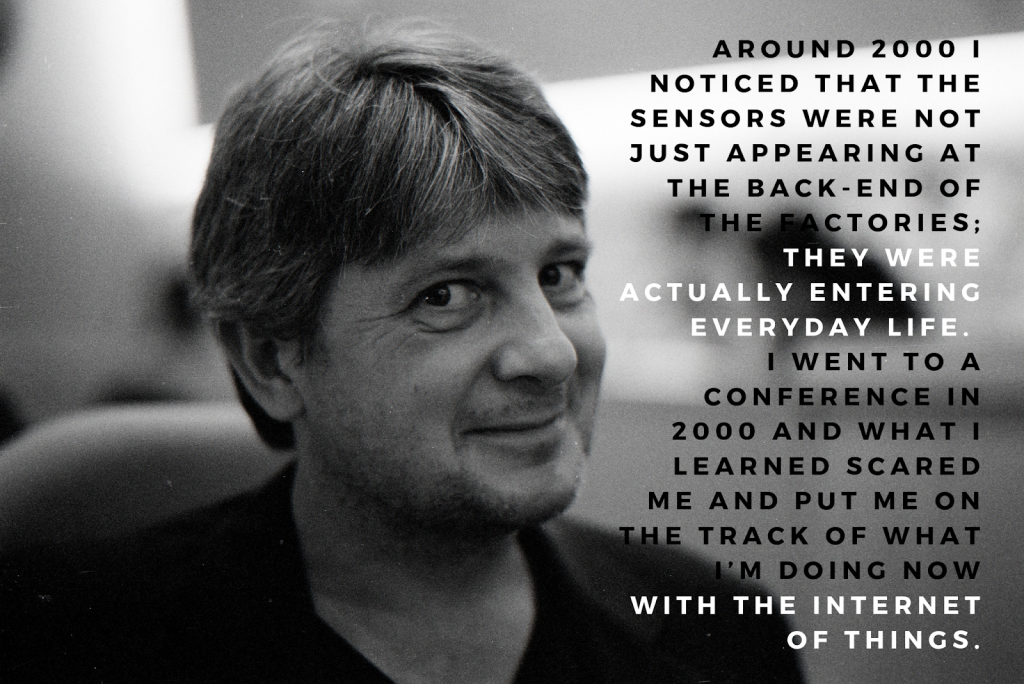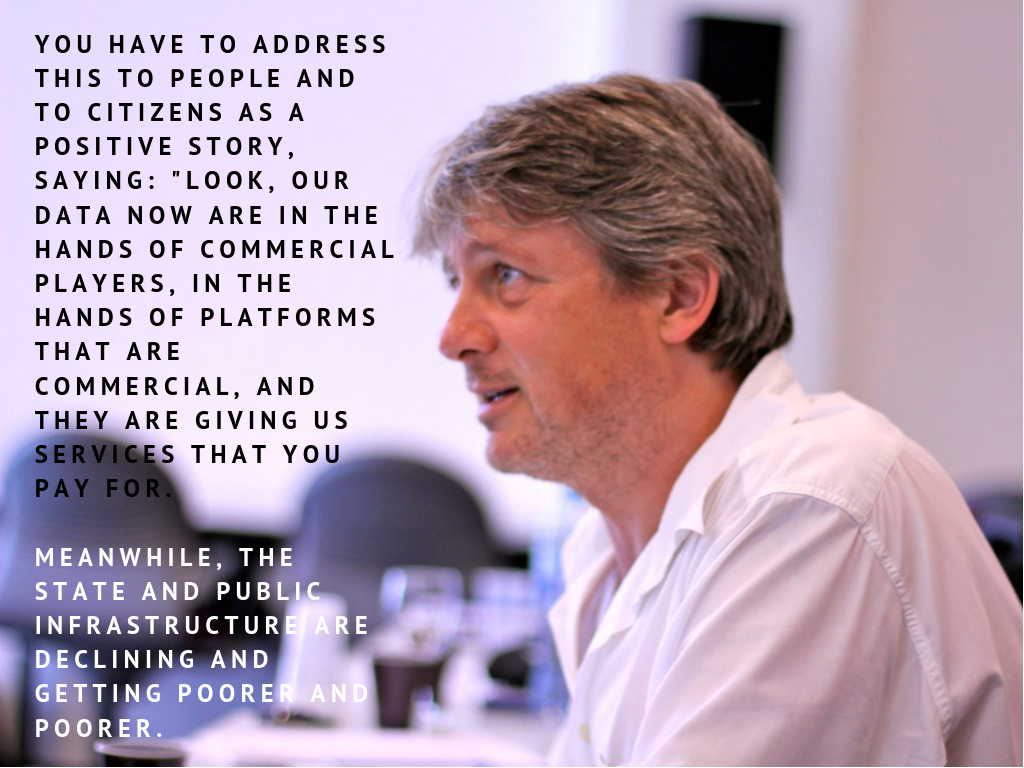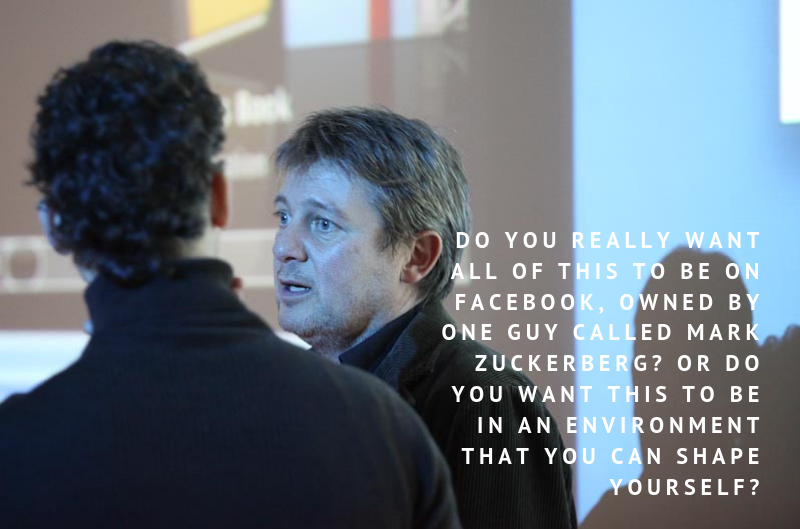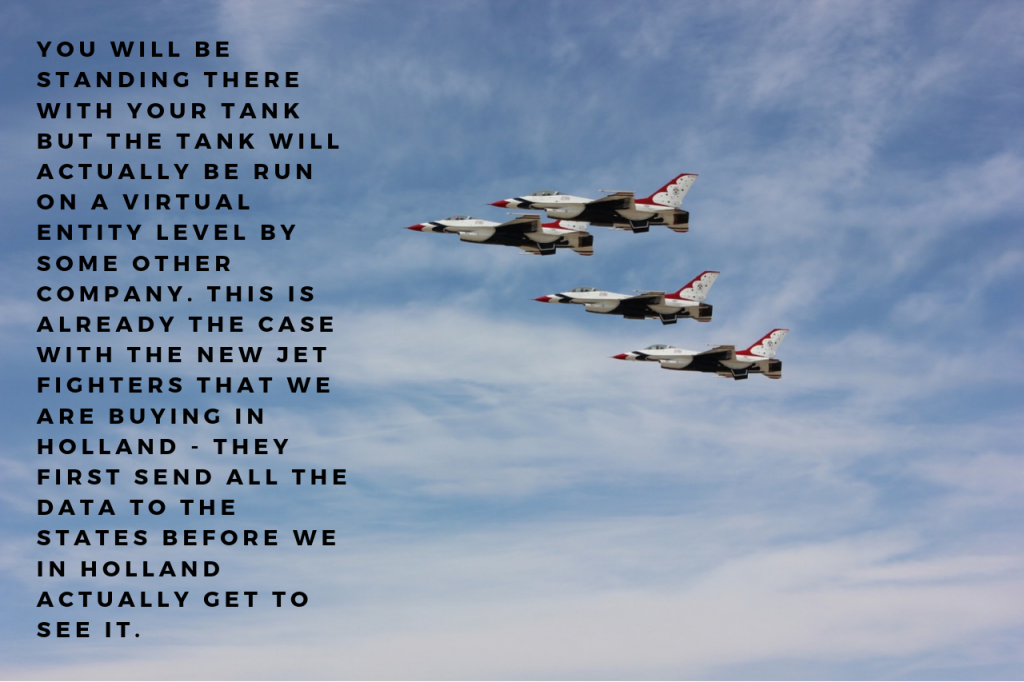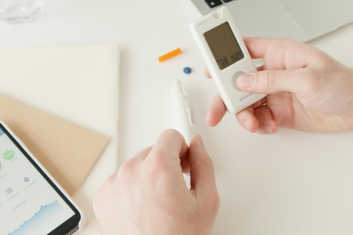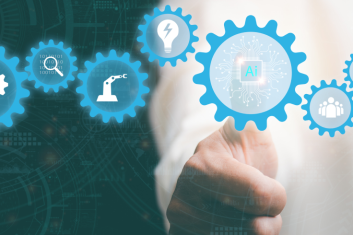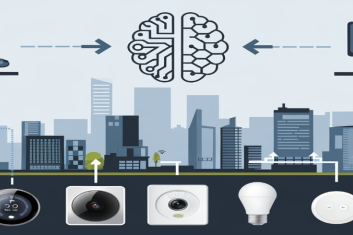Rob van Kranenburg is the founder of the Internet of Things Council, which is now his key focus. His experience gives him an especially insightful perspective on our “connected future” — a future he is already playing a part in creating.
Hi, Rob! Tell a little about your work and life.
When I was younger I was reading a lot. Basically, I was interested in literature and poetry and that is what I studied in the Netherlands.
In the ’80s we got the first access to computers. These were huge machines, where you could basically look up a library around the world, and it was all very exciting. This was around the time of hypertext. As I was investigating the French deconstructivists, I realized people could actually “click” ourselves away from dependence on the text. And for people, it was a massive liberation.
In the ’90s I was making websites and really enjoying all this type of liberation from plain text and the freedom that we had to investigate and find new data. Around that time the commercial players were coming on the scene. This was the time of the browser wars and also the time of cheap sensors becoming available to web designers. By the end of the ’90s, I noticed at all the interaction design festivals that people were doing a lot with sensors.
Around 2000 I noticed that the sensors were not just appearing at the back-end of the factories; they were actually entering everyday life. I went to a conference in 2000 and what I learned scared me and put me on the track of what I’m doing now with the Internet of Things.
Want to build an IoT solution?
Contact us now and get a free quote.
Aleksandra Golik
Head of Sales
at HQSoftware
I saw that if we were to continue like this, the world would become a place where every object would be uniquely addressable and identifiable. At the same time, it was possible to give many objects a little bit of processing power, which was rapidly going down in cost. The hardware and connectivity itself were becoming a commodity costing nothing, or very little. This was a very scary world, so I wanted to stay on top of that. On the other hand, the transparency that was in these systems, taking everything to a level of objective decision-making, was very necessary and very good. So it was a dual feeling that I had.
How do you see this unfolding right now?
The first iterations we see now of this potential freedom of people to share information and collaborate is now in the hands of American surveillance capitalists, the over-the-top players,—or national states. I am trying to make sense of it and set up a network of experts, which is called the Council. I set up the #IoTDay for people to discuss this and raise awareness about it because I think potentially this is tremendously good for ordinary people. And they need to be really aware of what is actually happening.
Speaking about the future, in one of your interviews you proposed the idea of smart cities, where all the smartphones of ordinary people are connected to a network, and the city is connected too, and can charge citizens the amount of tax they need to pay for the real use of street lights, sewage systems and so on. Can you develop this idea for me?
To me, this is kind of a logical situation. We are used to living in places where we pay taxes, which is normal and a good thing. And for these taxes we receive services. There have to be good roads, good education, and healthcare. I happily pay for these services, of course, if they are provided, and I think people should do that because the public infrastructure that we all share should not be fully in commercial hands, only for the purpose of making money or to create shareholder value.
We see this now in my own country, Holland. We have privatized a lot of these services. We have seen hospitals going bankrupt, or going bust, which is a crazy thing for us all to see because the government has basically not kept all this communal infrastructure in their own hands.
It’s very important that you have the potential of centralizing infrastructure because you need to be able to offer people who pay taxes on these kinds of services.
So what is the exact problem with infrastructure? How should this be addressed?
The problem that we have in the West is to decide between two models: let’s say the model where Google, Apple, Facebook have all the data and the Chinese model where the government has all the data.
The last Chinese government had twelve politicians, and nine of them were scientists and engineers. So in China they immediately realized that if they lose this data layer they lose their agency to govern, they basically lose their power. For them, it was very important to keep that data and those platforms in Chinese hands.
In Europe and also in Russia, we made a mistake. Russia is now trying to reclaim its own Internet, but it should do this in a positive way, not in a negative way where people may think that this is about censorship and turn away from it.
Citizens have to understand that building your own platforms and clouds, harnessing your own data of all citizens in communal hands, in public infrastructure, is a good thing.
It should be seen in a positive way, as a means of agency. It should not be seen in a negative way, where people think: “Oh, the government is now trying to control everything” or “The government is now trying to censor everything.” This, of course, will not work.
You have to address this to people and to citizens as a positive story, saying: “Look, our data now are in the hands of commercial players, in the hands of platforms that are commercial, and they are giving us services that you pay for. Meanwhile, the state and public infrastructure are declining and getting poorer and poorer. But this is what we pay taxes for.
If we are not careful in the West, citizens will stop and think: “Why am I still paying taxes to these people in government that no longer have agency over money, over instruments that they have privatized, over law that comes out of Brussels here in Europe, but they also do not have my data?”
So if I’m paying taxes, 50 or 60 percent of my money, to people who do not even have my data, then at some point I’m going to stop paying. So this is the conversation I’m having with Dutch policymakers, explaining to them: It’s a very serious situation. You need to think differently about this data and platform cloud layer. You need to have this in your own hands. Otherwise, people will realize that they’re paying money to commercial services. Why should they keep paying you?
But I know this will mean trouble. This is like a civil war. We see now in France, 60 percent, in some regions 95 percent, of all the traffic cameras have been taken out by presumably the “yellow vests.” This is very serious and this is also not good.
You can think that people have a right to protest — and they should because that’s important. But they should not go around smashing infrastructure. That is not helpful to anyone.
How do you help people understand this?
What I’ve been saying for a long time is: “Look, if you pay taxes in a certain region, then not only the roads and the hospitals but also the virtual roads, the virtual hospitals, and all the virtual representations of objects should be in public infrastructure hands.”
And the only way that I see this happening is to use the “last man standing” that the government has, which is the passport. The passport is the last means of power that these governments have at the moment. So it’s logical that we now see competition for the passport.
So World Identity Network, ID 2020, uPort, and Sovrin are all building passports directly competing with the national passport. This may mean that in five years I will be able to travel on an ID 2020 passport and no longer need my national passport.
Then it becomes really problematic for national states to still think that they have a role to play. So what I have been thinking about is, what if you turn the passport into a device? That device could be like a 5G phone, because we have these new networks that are coming up, and in 5G networks, you can hardcode security; you can build your own device that will talk only to your platforms and your cloud. That device also becomes a positive means of agency for citizens.
You will have direct feedback on your healthcare services, education. You can pay with this device, it is a free messaging service. There should be a balance between centralization and decentralization. The government should own the infrastructure but it should not dictate or determine all the services that are running in it. Then it will be seen as a controlling device and people will not want to use it.
Such a scheme should be built with the citizens. And people should realize that if they do not do this then their data will be in the hands of commercial players. This will be a much worse situation than the one we can build together. So we must put differences aside.
That means that people in government, people in policing and intelligence services, also the hackers — people who are against this initiative — they should be all around the table to discuss this new situation.
I heard you’re very involved in encouraging this way of thinking. What are you up to?
In the meetings that I’m having in Holland, I represent these ideas of building new public infrastructures not in commercial hands but in public hands. These public infrastructures should also be in the hands of new stakeholders. It should not be just all government or all citizens. It should be and the government, and service providers, and citizens, and hackers and coders, they all should come together and realize it is a new situation.
This phone, this identity management tool, then becomes one of the most important objects. It is like a simple Steve Jobs plan: you can control what goes in and what goes out. But you can also offer citizens of a very rich environment of applications and services.
The younger people, the millennials or the Y-gens, are so fully into these devices, that for them it would be quite logical. And you can say to them: You’re going to live here and you’re going to pay taxes and you’re going to get your education here. Do you really want all of this to be on Facebook, owned by one guy called Mark Zuckerberg? Or do you want this to be in an environment that you can shape yourself?
We can shape it together, it keeps all your data in our own clouds so that we can run our own AI on these huge data lakes and bring you better services for which you pay with your taxes. I think the kids will choose this over living in some kind of commercial Facebook La-la Land, and I also think it’s important because we need to slow this down. This is going way too fast and it is creating a lot of trouble.
I was in Moscow five years ago and met a professor who said: “Well, the kids are not coming with me anymore to pick strawberries in the woods.” And this was a very important comment. We all realized this is going way too far: we and our kids are all being seduced by these platforms that may be good in themselves, but they are totally tuned to one thing: making money. This is not good.
So we are losing our heritage — without being conservative, I am saying this — we are losing our literature, we are losing our way of life, all because we play according to some Silicon Valley Capital bosses’ rules. We need to take this back into our own hands again.
We need to have some very serious plans and this kind of device-as-passport idea is a serious plan. And very interestingly, recently I found a book from the 1960s which is called Woman on the Edge of Time by Marge Piercy. It is a science-fiction novel and it actually describes such a device; she calls it a kenner. In this novel, people have such a device linked to some kind of central data platform.
How exactly does such device-passport work?
So the idea about having this passport as a device is that you never have one identity in that device. You only expose your identity in terms of attribute-based identities. You can say you are plus 18 years old, a female, have this education. You don’t expose your full identity all the time with that device in the environment because that would lead to some kind of a real control situation.
If you own the infrastructure, there is no need to own all the services or to even think you should have censorship on a data level. This is the problem with the Chinese situation, where the engineers own the system and they also want to own the services.
They want to own everything in the end, but such a system can only break, because if there is too much stasis in the system, too little innovation, too little real longing for people to be in such a system. They will start to back out and revolt and not say real things, and this will lead to a lot of false data for the system that eventually will crash. People want freedom, this is what we are, so if you own the infrastructure you have no need to control the services.
Contributing to such a system, people are contributing to their own welfare, to their own new services — which are now in the hands of Mark Zuckerberg and Jeff Bezos, people that I do not know and also do not trust. I’m handing them my data every day. It’s crazy; it’s like you are handing out things to people that have no interest in you but just want your money.
As you are doing this, your own region, your own city, your own street is getting poorer. So why should the street, or the city, not organize the same kind of services? This is not rocket science, this is very simple stuff: sensors, data, platforms. But you need to be able to build your own clouds and platforms.
It’s a matter of survival. This is what I think the Russian Federation is seeing. They see what China is doing and realize they cannot go on like this. They have lost the data platforms. They have been trying to build their own data platforms and clouds with their own social media applications and services, but they are losing, like everyone else in the world that is not China or Amazon. They are losing the third step, which is the AI that is running in the Big Data.
And if you lose that stuff, then you basically have no more control over your region and you are powerless. You may have some tanks, money, intelligence services, control mechanisms, but they will be overtaken by over-the-top players. Just like Airbnb went to the housing market and Uber went to the taxi market.
Some new governance models will go for the governance market, and so then you will be standing there with your tank, but the tank will actually be run on a virtual entity level by some other company. This is already the case with the new jet fighters that we are buying in Holland — they first send all the data to the States before we in Holland actually get to see it. This, of course, means that you basically have lost control of your own military intelligence.
Now, this is happening to anyone who is not owning their own virtual entities. You have to be able to name and do identity management on your own virtual identities, which are your people, your objects, and your processes.
So this is basically the story. You need to sit together with engineers, psychologists, with people who are in power. These people in power have to understand that they need to look differently at people who are not in power or who are against them: the activists, hackers, progressive people; these people are now your allies. They are objective friends.
Most anarchists, anarcho-communists, hackers or coders, progressive people, want a good society. They are not in favor of big companies and they want good public infrastructure. When I talk to people in the police in Holland and intelligence services they want the same thing. We want good public infrastructure. People who were maybe against each other in earlier iterations should now find each other, to build good public systems.
The most important thing at this moment is for people to see that we need new teams to build these new public infrastructures. You need coders for that, you need engineers. And you need also to build a better balance between centralization and decentralization. Centralization is very necessary for the infrastructure, and decentralization is necessary for the services — we need to find the balance.

HQSoftware Founder
Having founded the company in 2001, uses his broad knowledge to drive the company forward. Ready to share his wisdom on software development and technology insights
Related Posts
View All
We are open to seeing your business needs and determining the best solution. Complete this form, and receive a free personalized proposal from your dedicated manager.

Sergei Vardomatski
Founder

